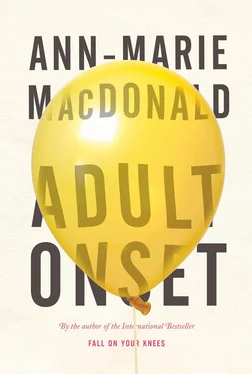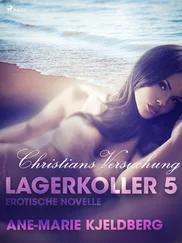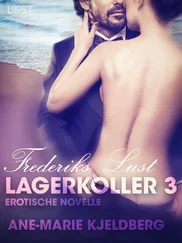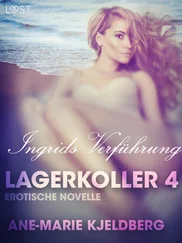They pass a flower shop — winged Mercury is stamped on the glass, the messenger god with his meek bouquet.
“Oh look, would Maggie like that?” Dolly’s attention has been snagged by a sparkly arrangement with a heart-shaped balloon: Forever in Our Hearts .
“Mum, not that.”
She shepherds them toward a sign that says Eatery with an arrow pointing down and nudges them onto the escalator.
“Mum, hang on to the railing.”
They make it to the food concourse. It could be worse: the bolted chairs and tables are of blond wood, the lighting is good. Her father treks over to the Tim Hortons counter between the sushi bar and the Pita Pit while she guides her mother to a banquette. Duncan rejoins them with a tea, two coffees and, tossed genially onto the table, “A whole bunch of junk.”
“Danke schayne,” says Dolly, flirtatious. She tips a packet of Splenda into her tea and bites into a doughnut with sprinkles.
“Mum? Why do you bother with Splenda?”
“So I can have a doughnut.”
“I don’t think it works that way.”
“ ‘By your children be ye taught!’ ”
Faux slap.
“The gal behind the counter,” says Duncan appreciatively, “she was speaking Japanese or Swahili, I’m not sure which.”
Dolly smiles. “So many Orientals in BC nowadays.”
Her mother does not remember, her father needed not to know, and Mary Rose is left holding the bag. Of bones. And reading them … This is how crazy ladies are made. Best drop it.
“They’re taking over,” says Duncan, “and that’s probably good news for the rest of us. If you really want to be bilingual nowadays, learn Mandarin.” He bites into a crueller, his eyes boyish blue.
Dolly digs into her purse and comes out with a paperback copy of Journey to Otherwhere . On the inside cover, a Post-it Note specifies the inscription: “For Phyllis, My Best to You.” Phyllis is getting married again.
“Your mother should be getting a percentage,” says Duncan with a wink.
Dolly finds a Best Western pen in her purse and, as Mary Rose signs the book, chants, “I used to be Abe Mahmoud’s daughter, then I was Duncan MacKinnon’s wife, now I’m Mary Rose MacKinnon’s mother!”
“Mum, how come you never say ‘I used to be Lily Mahmoud’s daughter’?”
“He was head of the family.”
“She did all the work.”
“He came to this country with nothing and—”
“I’m just saying—”
“ ‘If I say black is white, it’s white.’ ”
Duncan laughs. “Look out, Mister.”
“Mum, that is meaningless.”
Duncan says, “It was meaningful, all right, it meant he was the boss.”
Don’t kick the football . “I know, Dad, and look at the result.”
“What ‘result’?” says Dolly. “You’re the result, I’m the result, and we have Puppa to thank—”
“Exactly.”
“What’re you getting all worked up for now?” says her father in his innocent-bystander tone.
“I’m not worked up, Dad.” You kicked the football .
“In the old country—” says Dolly.
“Please don’t tell me about good slaps.”
“No one can tell me Puppa didn’t love Mumma—”
“I never said—”
“His pockets were always full of candy!”
Duncan laughs.
Mary Rose says, “Mum? Is that who gave you the candy?”
Dolly’s brow creases. “What candy?”
“… Nothing. It’s okay.” She hands the copy of Otherwhere back to her mother and it disappears into the purse.
Duncan marshals a gruff tone. “How’s the new book coming?” Tone of high esteem.
She does not want to hurt his feelings by telling him that she is not going to write it. “Well, in a quantum sense, it’s already out there just waiting for me to look it into existence.”
“That’s one very sophisticated piece of procrastination.”
They laugh.
On the other hand, why does she assume it will hurt him if she does not write the third? Is she self-sabotaging in order to punish him? Is she still willing to do — or not do — anything to get his attention, including fail miserably?
She gives him the Atwood book. He frowns, pleased. “What’re you spending your money for?”
“You’ll get it back, Mary Rose,” says Dolly good-naturedly. “You’re getting the silver tea service when I go.”
“Go where?” says Duncan.
She chats with her father about the fascistic tendencies of the federal government and the roots of the current economic collapse. “Bush, Cheney, Rumsfeld, Rove and the whole lot of them should be tried for crimes against humanity,” he says. “And that goes for Milton Friedman too.”
“Milt Friedman,” says Dolly. “Did we know him in Germany?”
“Like the fella says, ‘Those who don’t remember history are doomed to repeat it.’ ” He takes a newspaper from the pocket of his jacket.
Dolly opens her purse again.
“What are you looking for, Mum?”
A number of objects surface: the folded tartan tote bag, collapsible hairbrush, packet of jam from the train, the rosary, the Living with Christ pamphlet — the brown “Sunday Offering” envelope still tucked in its pages, perhaps her mother is holding out on the Church — the small grey velvet box …
“Is that it, Mum?”
“Is what it?”
“Your moonstone ring.”
“Yes, in the box.”
“Is that what you wanted to give me?” Her mother has been carrying it around the whole time … Mary Rose prepares herself to be moved. This is what difficult mothers do in the end: bestow upon their embattled daughters a token of their love. Roll credits.
But Dolly says, “Why would I give you that?”
“Because … Dad gave it to you when Alexander was born, and … it was a hard time, and I was … kind of there.”
… a fuzzy Chiclet, pussycat change purse, plastic pill container, the rosary again, mini address book from a hair salon … bits and pieces, concrete counterparts to the tiny words that have beset Mary Rose and murdered meaning in a hail of prepositions. She looks away.
This is what you get in the end. Fragments. Parts of speech. Her mother has gone to bits. Her father is on a saner-seeming loop. He knows how to make lunch. Supper cannot be far behind. Don’t ask for the moon — or even the moonstone. Her mother has said “sorry.” Her father has said, “Some things really do get batter.” Dear Dad, I . Maybe that was it — the whole of her reply to his touching e-mail, maybe she finished it after all. The sense of “something missing” simply comes with the existential territory. Somewhere inside she is still wailing, damp, toothless and tiny against his bare shoulder. Snap out of it, you’re forty-eight years old. Leave them alone.
Her parents will be re-boarding the train for their home in Ottawa in less than an hour. Their home, in which they are independent and ask nothing of their children except that they visit. They have just crossed the country as they have done so many times, two little old Canadians traversing the vastness — west to east this time. When the Rockies gave way to the foothills and the forests thinned to prairie, when the train crossed the North Saskatchewan River and rolled through the outskirts of Winnipeg; past the Walmart and the McDonald’s where once there was a tavern, an arena, a rutted highway that led out onto the prairie … did her father’s hand give her mother’s a squeeze? Before she dozed off and he returned to his paper, did they think of Other Mary Rose? Did Dolly say a prayer?
Is she in the sky over the prairie? The vault of the heavens that holds us all, cherishes us all. Energy energy everywhere, endlessly returning love in the form of life, even mineral life. In the guise of time. Is the train part of her? Is the grass part of her? The sound of the horn, the cattle ignoring the rude blast, the car parked at the level crossing, family inside waiting to drive safely on, all part of her? She is everywhere now. Like God.
Читать дальше












